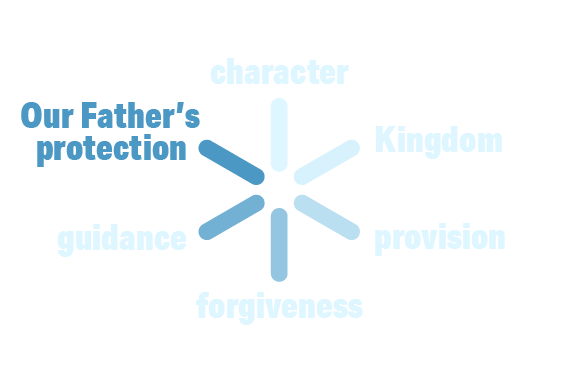“but deliver us from the evil one.” (NIV)
“but keep us safe from the Evil One.” (Good News)
Bern Leckie writes:
Talk of the devil! We don’t do this very often, in our family at least. Is Jesus prompting us to start?
This was a tricky realisation, to be honest. We’ve spent a lot of time discussing God as our loving Father, the source of our love and so many good things he has given us in his world.
When I think about how “the evil one” is represented, from high art to cartoons, I’m somehow stuck with this ridiculous image of a grinning, fiery-red villain with pointy horns and a pitchfork that any child would know to stay away from if they didn’t want to get stabbed, toasted and laughed at.
Of course, there are more grown-up stories of devilry, but I don’t think Noah is ready for too much darkness, horror or the subtle deceptions of The Usual Suspects’ Keyser Soze, but this character may have been truthful when he said that “the greatest trick the Devil ever pulled was convincing the world he didn’t exist.”
Nevertheless, here he is in the prayer Jesus taught us. We can’t pray this meaningfully unless we can describe evil and “the evil one”. How do we do this truthfully, acknowledging the closeness of evil to us without unnecessary frights and unhelpful cartoonification?
After some thought, prayer and discussion, we landed close to where we began Jesus’ prayer, with a reminder of God as our loving Father and what he wants for us.
We reminded Noah of what we have always chosen to want for him. It’s our parenting syllabus, the only things we need Noah to know as he grows up, the things we believe God wants him to know too:
How much he is loved (some of which he should see in us, some he will need to see in God)
How good he is at loving others when he practises this (and without practice he will never know)
As simple as this sounds, of course, life gets in the way. Lots of things make us feel unloved or unable to love. We can call these out as opposed to what God wants, the opposite of his goodness: evil. Is anything getting in the way of you or your friends knowing they are loved and able to love? God wants to deliver us from that.
Are there people opposed to God and love that we can recognise in the world? It might look like there are many. Jesus only tells us to pray against one, a source of evil, someone we can’t see in just the same way that we can’t see God. That is not any of the people who hurt us, and that’s very important. Our battle is not with people. It is with an enemy only God can defeat. (And the good news is… he has!)
We live in a culture which encourages us to protect ourselves from harm and accept that we might need to do this by firming up our judgements about people, who is right or wrong, good or evil, safe or dangerous, welcomed or cancelled.
But we want to get better at following Jesus, trusting God for protection, believing that his way of life works, and that Jesus’ prayer is effective. We want to keep praying it and growing our faith that we won’t run out of love, food, forgiveness, protection or purpose. I want us to trust God for these increasingly so that his Kingdom will come, and his will be done in Bristol as it is in heaven.



























